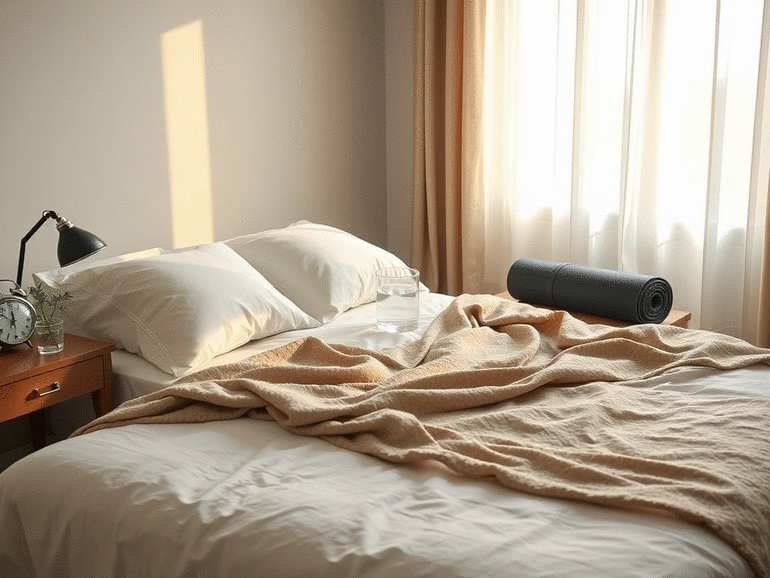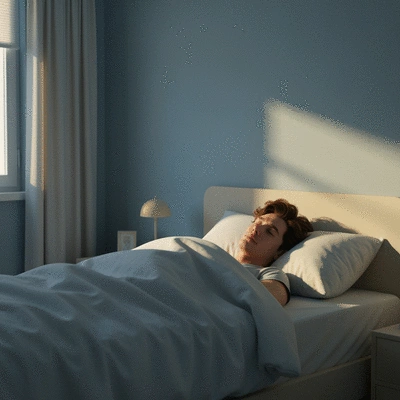Stress Disrupts Sleep Quality
- Elevated Cortisol & Adrenaline
- Insomnia & Frequent Awakenings
- Rumination & Anxiety
Stress hormones keep you alert, leading to difficulty falling or staying asleep, and increased negative thoughts.

What if the key to managing your stress lies in improving your sleep? Understanding the intricate connection between these two vital aspects of health can empower you to break free from their debilitating cycle. By recognizing how stress impacts sleep quality—and vice versa—you can take actionable steps toward a healthier life.
This visual illustrates the cyclical and interconnected nature of sleep and stress, highlighting how each impacts the other.
Stress hormones keep you alert, leading to difficulty falling or staying asleep, and increased negative thoughts.
Lack of restorative sleep diminishes your ability to cope with daily stressors, creating a vicious cycle.
Understanding this connection is crucial. Implement strategies like CBT for insomnia and stress management techniques to improve both.
Explore SolutionsHave you ever noticed how stress seems to creep into your sleep patterns? It’s a common experience that many people face, and understanding this connection is crucial for maintaining overall health. Sleep and stress influence each other in a cyclical manner, where one can amplify the other, leading to a cascade of challenges that affect our daily lives. At Stress Insight Solutions, we aim to empower you with the knowledge to break this cycle and foster a healthier mindset.
When stress levels rise, it can become increasingly difficult to achieve restful sleep. Conversely, inadequate sleep can heighten stress, creating a feedback loop that feels impossible to escape. Let’s explore how these factors interact and what you can do to manage them effectively.
The sleep-stress cycle involves a complex interplay between our physical and emotional states. Here are some key elements that illustrate this connection:
Recognizing how these elements interact allows for better coping strategies. By addressing both sleep and stress simultaneously, you can create a more balanced life.

Delving into the biological mechanisms, we find that our brain chemistry plays a significant role in the sleep-stress connection. During stressful times, the body releases hormones like cortisol and adrenaline, which prepare us for "fight or flight." This response can make it difficult to unwind and fall asleep. A Penn Medicine study, for instance, shows how stress activates specific neurons that disrupt sleep. Here’s how it all links together:
Understanding these mechanisms lays the groundwork for effective stress management techniques that can improve your sleep quality. Remember, addressing the root causes of stress can pave the way for better rest, and vice versa.
Now that we've explored the connection between sleep and stress, let’s take a closer look at how stress specifically impacts sleep quality.
Stress can lead to a variety of sleep disturbances that hinder both your sleep quality and overall well-being. Common issues include:
Recognizing these signs is the first step toward effective intervention. Acknowledging that stress is playing a role can help you take proactive measures to improve your sleep.
Negative thinking patterns can exacerbate sleep problems, leading to a spiral of stress and sleeplessness. When we ruminate on stressful events or emotions, it becomes challenging to quiet the mind at bedtime. Here are some emotional states that commonly affect sleep:
By learning to manage these emotional states, you can significantly improve your sleep quality and reduce stress levels.
Chronic stress can lead to various sleep disorders, impacting your health and quality of life. Some common disorders include:
Being aware of these disorders can help you seek the appropriate treatment. Remember, reaching out for help is a strong first step towards regaining control over your sleep and stress.
To effectively manage the cycle of sleep and stress, consider integrating mindfulness practices into your daily routine. Techniques such as meditation, deep breathing, or yoga can help calm your mind and reduce stress, making it easier to achieve restorative sleep. Start with just five minutes a day and gradually increase your practice as you become more comfortable.
As we wrap up our exploration of the intricate relationship between sleep and stress, it’s crucial to recognize their bidirectional effects. Poor sleep can amplify stress levels, while high stress can disrupt our ability to sleep soundly. This cycle not only affects our mental health but also our physical well-being.
Being aware of how sleep and stress intertwine is the first step in managing them effectively. As someone deeply passionate about mental health education, I believe that understanding this connection empowers you to recognize when stress or sleep issues arise. Let's take this knowledge and turn it into actionable strategies!

Now that we've delved into the complexities of sleep and stress, it’s time to take action! I encourage you to start implementing some of the coping strategies we discussed earlier. Create a personalized plan that addresses your specific needs and circumstances. Remember, it’s okay to seek professional help if you feel overwhelmed.
At Stress Insight Solutions, we provide resources designed to guide you on your journey toward better mental health. Whether you need practical tips for sleep hygiene or expert advice on stress management, we’re here to support you!
When it comes to managing stress and sleep issues, behavioral therapy can be a game changer. Techniques such as cognitive-behavioral therapy (CBT) can provide you with the tools to identify negative thought patterns and replace them with healthier alternatives. For example, a review published in PMC NCBI highlights the effectiveness of CBT in treating chronic insomnia.
Investing in therapy can significantly enhance your understanding of stress and sleep, ultimately leading you toward a more balanced life. Remember, at Stress Insight Solutions, we're here to provide resources and support every step of the way!
Here is a quick recap of the important points discussed in the article:
We illuminate the causes and effects of stress through science-informed resources, empowering you to recognize stressors and implement effective coping strategies. Your mental well-being is our priority.
